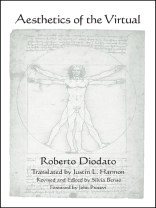Reconfigures classic aesthetic concepts in relation to the novelty introduced by virtual bodies.
Arguing that the virtual body is something new-namely, an entity that from an ontological perspective has only recently entered the world-Roberto Diodato considers the implications of this kind of body for aesthetics. Virtual bodies insert themselves into the space opened up by the famous distinction in Aristotle’s Physics between natural and artificial beings-they are both. They ...
Table of Content
Foreword by John Protevi
Introduction
1. Aesthetics of the Virtual Body
2. My Body in the Virtual Environment
3. Forms of Expression
4. Towards the Image...
About the author
Silvia Benso is Professor of Philosophy and Director of the Women’s, Gender, and Sexuality Studies Program at the Rochester Institute of Technology. She is the auth...












